I am a mother with ADHD. Keeping up with chores, keeping track of time, and being patient are all challenges I face
A mother suffering from Attention Deficit Hyperactivity Disorder (ADHD) has spoken out about the problems the condition causes for new parents.
Geraldine Kostrewa, 28, from south-west England, has described how keeping time, keeping up with chores, planning parties and managing moods all pose particular challenges as a parent of a toddler.
But she also described how her little one helps her cope. She says that sometimes she and her four-year-old daughter even have a “brainstorm” to explain why “mommy gets frustrated.”
Geraldine, better known as Cherry, says her condition makes simple things like household chores, birthdays and appointments problematic.
Cherry was first diagnosed with ADHD as a child after teachers became concerned about her lack of attention in class.
Geraldine Kostrewa, 28, from south-west England, has described the specific challenges that ADHD brings to new parents, ranging from keeping track of time and chores to planning parties and managing moods.
After coming across misinformation about the condition, her parents decided not to seek treatment — and so Cherry was left in the dark about her diagnosis until she went to college.
At age 23, Cherry felt like her ADHD was under control, and she hoped she could carry on without thinking about it too much — until she had her daughter Hannah, who was born four years ago.
After growing older and struggling to cope with increased responsibilities and daily household chores, she came across a video showing how the condition can affect mothers.
Relieved that she wasn’t alone, Cherry started thinking about how ADHD affected her parenting; she had difficulty managing her time, dealing with mood swings, and dealing with overstimulation.
Now Cherry, who shares her experiences on her social media under the handle @cherry.adhd, has found coping strategies that have helped her manage her ADHD in addition to her family life.
“I was diagnosed with ADHD at the age of six or seven in Switzerland – my teachers brought it up,” Cherry said. “I didn’t know about my ADHD diagnosis until I was 23 and in college. I suddenly remembered that I had done all these tests, so I asked my parents.
‘They said I was diagnosed with ADHD, but that didn’t exist. As a child, I was medicated for a short time until my parents came across this book that stated that ADHD was just a made-up condition.
‘My parents didn’t know any better then, they are much more open-minded now. I kind of ignored it myself until I got older and really struggled with it.

Geraldine, who goes by Cherry, posts on TikTok, Instagram and Facebook to reduce the stigma surrounding ADHD and draw attention to the positive qualities that many people diagnosed with it have in common
‘Knowing what I know now, I know that ADHD has had a huge impact on my entire life. Memory has affected me, for example remembering conversation details, but not the details I need.
‘It is a huge difficulty to keep up with daily household chores. They’re already a pain when you’re not a parent, but with a child there are even more things you have to do every day and it’s even more important to stay on top of them.
‘I’m constantly late and have trouble planning things like appointments and birthday parties. I also have a performance disorder, so I have trouble starting, planning and prioritizing, or completing and reviewing tasks.
‘When I became a mother, I really suffered from overstimulation and emotional dysregulation. Being patient can be very difficult because if you have ADHD or hyperactive impulsive ADHD combined, that’s a big part of it.
“I tried so hard to be that perfect parent that it seemed so effortless to other people. I started snapping a lot and feeling like a bad parent and a bad partner.
“I’m a mild-mannered mother, so it became very clear that I had emotional dysregulation.”
As a “gentle parent,” Cherry avoids yelling and prefers to work with her daughter to deal with conflict and difficult emotions by talking them through – which became increasingly difficult as she struggled with her ADHD symptoms.

Geraldine has explained how her toddler, Hannah, aged four, helps her cope with her ADHD symptoms. When Geraldine becomes frustrated, mother and daughter will ‘brainstorm’ different responses to the situation
Emotional dysregulation is a common symptom of ADHD where it is difficult to control emotional responses to situations.
Through a combination of working with her support network to establish routines, working on her self-love and self-esteem, and communicating with her partner and her daughter, Cherry feels she can manage her ADHD and her parents based on her strengths. points.
‘With emotional dysregulation and the overstimulation that accompanies it, you often have a lot of feelings of guilt and shame and a critical voice in your head, which can only make the situation worse.
‘My parents raised me in a very authoritarian way, so I tried to ‘re-educate’ myself by telling myself the opposite things I was telling myself at the time.
“Instead of telling myself that I shouldn’t be angry or feel this way, I had to tell myself that it’s okay to feel frustrated or overwhelmed. By doing that, I calmed myself down.
‘Processing things verbally has been very helpful, because with ADHD it can be very difficult to automatically process things internally.
‘I also take some time for myself: if I feel tension rising with my partner or my child, I go to another room.
‘I explain that mum is feeling frustrated, finding things difficult at the moment and needs some rest. I then take a moment to catch my breath and block out noise and turn off all distractions to reduce overstimulation.
‘Now she’s doing the same! When she feels frustrated, she tells me, “I’m angry, Mom, I need some rest!” She responds very well.
‘I’ve made sure that when I have moments where I’ve snapped at her, or when I feel generally upset or over-stimulated, I admit it and apologize afterwards.
“I tell her it’s never okay for mommy to yell at you, it’s not okay for anyone to yell at you.
“I explain what was frustrating me and that it’s not her fault and that I love her – and then we brainstorm what would be a better response from me next time.
“It shows her that her parents aren’t perfect and that we’re still learning, and that it’s important to admit your mistakes and there’s no shame in apologizing.”
“It also teaches her ways to deal with that emotion if she ever feels that way.” I try to focus on my strengths. For example, I am spontaneous and can do many fun activities with her.

Unfortunately, Geraldine’s parents didn’t take her ADHD seriously when she was a child, and it wasn’t until she was in college that she received a full diagnosis.
‘I try to divide play time between activities to work on my problems. I try to include her in the daily chores, which makes it a fun activity.’
Cherry shares her experiences online – with a combined following of more than 830,000 followers on TikTok, Instagram and Facebook – in the hope of reducing the stigma surrounding ADHD and showing other mothers that it’s okay to talk about their problems.
She explained: ‘It can be very easy to feel guilty or like you’re not good enough as a parent.
‘Be careful when searching for information as, unfortunately, harmful content exists. Not everyone will be well read about the condition and many people unfortunately spread misinformation.
“Many people still feel that ADHD is just a label that people want as an excuse for laziness, or that it doesn’t even exist. It is so problematic because it prevents people from seeking help and support when they actually need it because there is still a stigma surrounding it.
‘With ADHD you often feel like we are never good enough and that we always fail to live up to our potential, but you are good enough. It takes a lot of work, but life gets better when you know what you’re up against and where they come from.’
